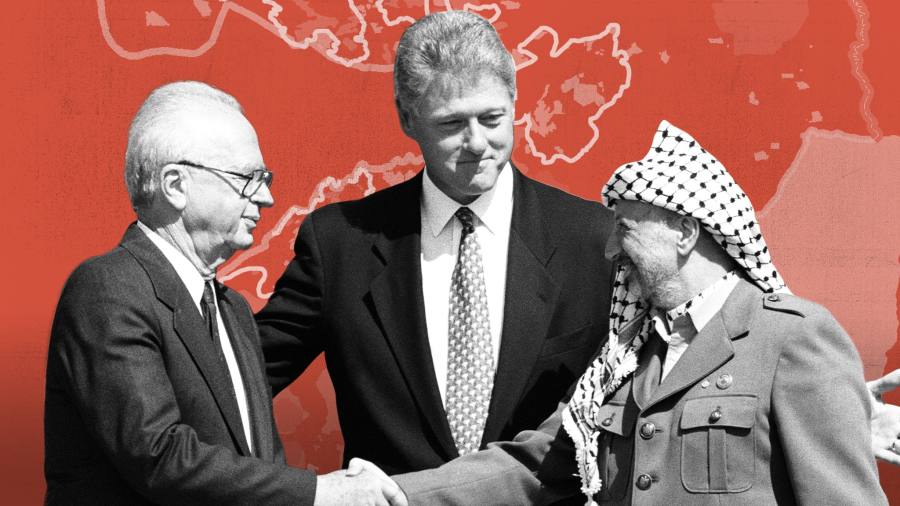
Receive free Israeli-Palestinian conflict updates
We’ll send you a myFT Daily Digest email rounding up the latest Israeli-Palestinian conflict news every morning.
The writer was state secretary in the Norwegian ministry of foreign affairs when the Oslo Accords were signed. He is now secretary-general of the Norwegian Refugee Council
Almost 30 years ago, as a young Norwegian diplomat, I sat on the lawn of the White House and watched US president Bill Clinton host two sworn enemies promising to work towards a peaceful future for their peoples. For eight months my life, and that of a small team, had been consumed by organising 14 rounds of negotiations in our secret Norwegian diplomatic back channel. Against all odds, it produced the first mutual recognition between Israel and the Palestine Liberation Organisation, and a first agreement of principles for how to achieve peace.
The signing of the Oslo Accords was a rare moment of optimism in the long and bitter conflict. The diplomats around me gasped as Israeli prime minister Yitzhak Rabin and Yasser Arafat, chair of the PLO, shook hands. We all got to our feet and applauded. Thirty years on, each visit I make to the still occupied Palestinian territory leaves me asking how the situation for the civilian population could possibly get any worse. Meanwhile, Israel has sought to normalise its relations with countries elsewhere in the Middle East — notably in the so-called Abraham Accords it signed with the United Arab Emirates in September 2020.
An endless cycle of hopelessness, humiliation and violence is now daily life for many Palestinians. We are at a stage where even an Israeli general has condemned the violence of mafia-style settlers as “terrorism”, at the same time as Israeli ministers openly incite violence against Palestinians. In 1993, we had visionary and courageous leaderships on both sides. Now, Palestinian leaders are divided and disconnected from their people. Extremists in the Israeli cabinet promote illegal settlement expansion and annexation of occupied territory.
Back then, settlements were home to 280,000 settlers. Today, they count more than 700,000, blocking peace and rendering any future Palestinian state increasingly unviable. Land grabs are accelerating: in recent months, I have witnessed how state-sponsored settler violence has driven out one Palestinian community after the other from their homes. The international diplomatic response is surprisingly ineffective. While war and occupation in Ukraine has rightfully brought a strong and collaborative response, a far older occupation thrives in plain sight.
Critics of the Oslo Accords highlight the glaring gaps in the Declaration of Principles and our naive optimism. We did indeed underestimate the enemies of peace on both sides, and key opportunities around the final status issues were lost during those first honeymoon months. But the alternative to an imperfect initial agreement and mutual recognition was the hopelessness of endless conflict, occupation and terror. When the agreed timetable for achieving a final peace agreement broke apart, it was, however, all over. Actors on both sides, as well as the international community, must share the blame.
We cannot wait 30 years for another, more successful, breakthrough. In a conflict where few facts are agreed upon, one naked truth is that the asymmetry between the parties, where one side dominates the other, has made it impossible to make progress through direct bilateral negotiations. Only the US has the leverage and the ability to provide the guarantees both sides need.
There is not much time. The current Israeli government has tabled reckless plans for 13,000 new settlement units during 2023, almost three times that of last year. It has, short of an announcement, annexed the occupied West Bank, with a clear intention of making its occupation a permanent fixture. This year is already the deadliest since 2005 for Palestinians in the West Bank. The overcrowded Gaza Strip is under endless siege that foments generational bitterness. The alternative to robust mediation is deepening conflict and violence that will engulf Palestinians and Israelis with the potential for greater regional destabilisation.
The US can corral Europe, Arab countries and the UN to demand the protection of Palestinian human rights and an end to the brutal occupation. It can give Israel the security guarantees that it requires. Both parties agreed in Oslo to submit unsettled disputes to international arbitration. Now, more than ever, this is necessary. Thirty years ago, our credo was that a “just, lasting and comprehensive peace settlement” will lead to “peaceful coexistence and mutual dignity and security”. This can still be achieved. It is not too late.